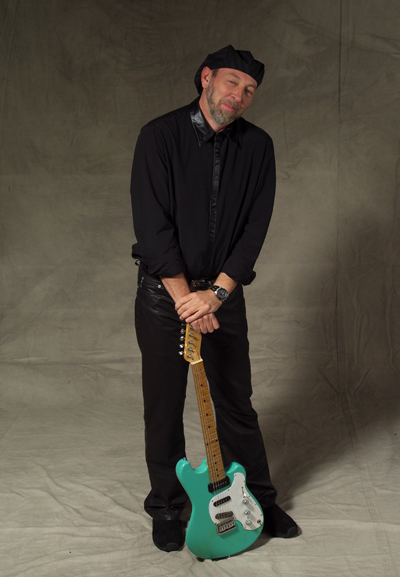
Donate to Innerviews
Since 1994, Innerviews has provided uncompromising, in-depth interviews with musicians across every genre imaginable. And it does that with no trackers, cookies, clickbait, or advertising.
Your donations are welcome to help continue its mission of highlighting incredible music and artists, without any commercial considerations.
Your contributions will be instantly transformed into stories and videos, and cover hosting and web management costs. Importantly, your dollars will help ensure Innerviews remains absolutely free to all visitors, independent of their ability to financially support it.
Please consider making a donation today by using the PayPal QR code below.

Richard Thompson
Sway Into Emotion
by Anil Prasad
Copyright © 1991 Anil Prasad.

Richard Thompson’s name is often bandied about the media as a reply to unasked questions. For some scribes, he’s "Britain’s answer to Bob Dylan." For others, he’s an "intelligent response to the banality of the current pop spectrum." Perhaps Thompson’s unassuming, almost self-effacing reaction to decades of accolades for his high-caliber singer-songwriter and guitar work has encouraged those observations. But he’s far too involved in his craft to generate or care about hype-laden soundbites. It makes the title of his new album Rumour and Sigh rather appropriate.
When Thompson isn’t recording and touring as a solo act, he can occasionally be found with his part-time outfit French Frith Kaiser Thompson. The straightforward moniker refers to bandmates John French, Fred Frith and Henry Kaiser. Together, they create humorous, twisted material ranging from venomous takes on pop standards to mini-operas to Okinawan folk songs. The recently-released Invisible Means reveals the depths of the group’s collective eccentricities.
The critical consensus is that Rumour and Sigh is your most accessible record to date. Do you agree?
I’m always making a conscious effort to be viable and accessible. Obviously, I’m not very good at it or I would have sold billions of records by now. [laughs] With a major label release, I certainly want to give them something they can work with if possible, without compromising my artistic integrity man. [said tongue-in-cheek] I do like to please myself on records though. I don’t like making records for other people. It’s a very forced job. So, I try and self-criticize and rely on quality as the yardstick.
What overt influence did the label have on the record?
They changed a song title. One was called "The Lost Sheep Returns to the Fold." [original title of "I Feel So Good"] They didn’t think it was snappy enough. They’re probably right, but I like those Gilbert & Sullivan titles. It’s not really interference though, because in a sense, I don’t know anything about record companies or how they work as far as marketing. I don’t really care what they do in terms of what they put on the radio or how they package something. If they think they know how to do it, I’m willing to see what they come up with.
Speaking of marketing, Capitol is financing an elaborate animated video for "I Feel So Good."
Yes, as we speak, thousands of Koreans are slaving over it. It’s being done by the same people who do The Simpsons. It doesn’t look like The Simpsons, but it’s very, very interesting. It’s quite an original piece. It’s my first promo video since 1983. Since then, they’ve been using bits of a long form concert video called Across a Crowded Room they shot in Ottawa, Canada at a club called Barrymore’s.
Why was the Ottawa gig chosen for filming?
They wanted to do it in Canada because the crews are cheaper to hire here, wouldn’t you know? [laughs] Barrymore’s was the only gig that would work out and allow us to set-up at the last minute. I’m sure the Ottawa audience couldn’t even tell it was Barrymore’s in the video because of the way it was shot with five cameras. The audience were kept hanging around throughout the night. We were there until 8:30 in the morning shooting cut-aways. Then we had to drive to the next show. It was a sleepless night.
Rumour and Sigh’s production is more complex than your previous albums.
I think sound is important when you’re making popular music. In the past, I’ve tended not to care too much about the sound, as long as it was reasonably true. I’m not sure that’s always a good way to make records. I think some of the great records use studio technology in a creative way to sway a song into motion and to add an emotional atmosphere. I think some records you might have liked when you were a kid may have a sound that might be bad. It could be badly recorded with tape hiss or surface noise, but whatever it is, it has something about it that moves you somehow. On this record, we really explored sound a lot—track-by-track. We spent a lot of time setting up to record. We would spend the morning figuring out what kind of drum and guitar sounds we would use to fit the atmosphere of a song, then we’d record it quite quickly. There was quite a bit of planning, but it was a quick record. It only took weeks. All of my records are quick. We don’t spend much time on them.

The production on "Why Must I Plead?" sounds like something out of the late ‘60s.
It’s because the drums are panned to one side. Normally, you put drums in the middle. But it just didn’t sound right with the drums in the middle. Very, very strange. They just sounded better on one side. We all agreed. Even the engineer who was playing with the mix said "You know, I can’t deny that it sounds better on one side." [laughs] You probably haven’t heard anything like that since a late ‘60s Hollies record. Also, there’s no echo on that track at all. It’s totally dead and dry. It fits the song.
Rumour and Sigh is your third record with Mitchell Froom. How does he enhance the proceedings?
It’s a lot more fun having Mitchell in the studio than me doing it myself. If I’m out on the studio floor trying to play and sing at the same time and keep time and listen to the parts and to what everyone else is doing, it's very hard to get an overall view of what’s going on. I need someone to be more in control with an overview—someone who can say "This is good" or "That isn’t" because I haven’t a clue. Mitchell has a lot of innovative ideas with regard to working in a studio. With the two previous records, I think the first one was us getting acquainted and the second was a pretty good attempt. But on this record, Mitchell and I had a better understanding of each other’s musical ideas. Also, the rhythm section players were playing better this time. There was more aggression in the rhythm section. That was a great help for me.
Froom recently said that working with you is "largely a matter of keeping out of your way and letting the songs come out as they’re destined to."
I think that’s true compared to some of the other stuff Mitchell has done—like Maria McKee’s album where he had to find songs for her and then arrange them. I think a lot of my stuff already comes arranged because I play the guitar as well. I’m a self-accompanist first and then the accompaniment needs expanding into a band format. There’s a lot less to do.
Describe the inspiration for "1952 Vincent Black Lightning."
It’s about mythology. A lot of mythology is imported into England from America these days. All of the mythical place names used are American because of the influence of popular song—pretty much through the whole of this century since the 1920s. "Going down to Memphis" or "Going down to San Antonio" sounds great. "Going down to Scunthorp" doesn’t. [laughs] So, I really like to try and validate the use of British mythology in British songs. The Vincent is a rather wonderful, rare and beautiful beast. It is an object of myth. There’s not many I can think of in Britain. It’s hard to find these things. So, it’s the center—the loadstone—around which the characters in the song revolve around. It’s a romantic object. I suppose it’s a story that relates back to older British and Scottish ballad forms where we have an anti-hero central character, and even though he may die in the end, he sort of triumphs and gets one over on society first. It’s a bit like Robin Hood. There were a lot of ballads about Robin Hood in British folk music—always a very popular subject.
In contrast, "Psycho Street" stems from more contemporary origins.
There’s a soap opera on TV in Britain from Australia called Neighbours and it’s sapping the minds of our youth who are engulfed in it. And it has this really cheesy sing-along theme tune. I sort of object to the program because it purports to be about real people. In Neighbours, everyone is basically very nice and friendly—the salt of the earth. I thought this was really not true, so I wrote an antidote to the Neighbours theme. So, it includes a few episodes from real life from my neighbors, or the people who are supposed to be my neighbors. I made all of them up though.
It’s the sort of song that would have felt at home on a French Frith Kaiser Thompson release.
It could have, yeah. In fact, we talked about doing it on the last record, but I thought "Gosh, that’s too obvious." [laughs]
How did the group initially come together?
I’ve known Henry Kaiser for a long time. We had been talking about doing something together for awhile. It seemed it might be a good idea to do something as a band. So, we thought "Who else could we get in here?" John French came to mind. Henry had something to do with his rediscovery. And we both knew Fred Frith and thought he was the kind of bass player we’d need for the record. There have been mixed reactions to the albums. It’s difficult for someone to like the records all the way through. I’m not sure I think they’re the greatest thing ever. [laughs] So far, the only live stuff we’ve done are warm up shows in the San Francisco Bay Area. A total of three gigs ever.
Despite that, Q Magazine refers to the group as "The Traveling Nobodies."
The Traveling Nobodies? [breaks into laughter and slaps knee] Oh, that’s brilliant! That’s great! We’ll have to use that. That’s wonderful.
The group’s latest album, Invisible Means, was released through Windham Hill in the States. As a result, it’s often found in the new age bins. What do you make of that?
I think it’s wonderful! The sort of people who buy Windham Hill records are the sort of people who say "I need half-a-dozen records and I’ll take a stack!" They don’t necessarily look at the cover, title or artist. They’re also the kind of people, who if they don’t like a record, wouldn’t bother taking it back. They’d just chuck it in a corner. So, I hope we’ve sold thousands by mistake.
You wrote the very operatic "March of the Cosmetic Surgeons" for that album. It’s unlike anything you’ve done before.
I thought it might be amusing to challenge Messrs. French, Frith and Kaiser with something of that ilk. It was a lot of fun to do. We got a real opera singer to come and sing in the middle of it. It was great. The tune is from an opera I never finished. Opera is too pretentious a word. Rather, it’s a play with music that I never finished. I was working on a longer-form piece. I’ve got two or three things in the works, but I’ve never been happy with them though. I’m studying opera at the moment in my humble way. I have to study more. I don’t necessarily want to write an opera, but a play with music and songs that are connected to a longer piece. It’s difficult to do in popular music. It’s been done very poorly—it ends up pretentious. I would like to do so something I feel would work and haven’t quite hit it, but it’s under way.

What can you tell me about "Hai Sai Oji-San?"
It’s a very famous song in Okinawa. The big folk rock star over there recorded it and helped revive traditional Okinawan music. It’s very popular in the rest of Japan, even though they can’t understand the words. It’s just a great song. We thought "Why not sing something in Okinawan?" We had a coach come in just to go through the pronunciation line-by-line. I’ve been told our version is intelligible.
Are there any plans for future French Frith Kaiser Thompson projects?
They’re difficult to do because we have four entirely different schedules. But if we do another one, I think we need an angle—like doing an album of Hawaiian Easter Songs. [laughs]
You recently worked on the soundtrack for the Australian film Sweet Talker. What do you recall about the experience?
It’s a wacky, lovable romantic comedy that will probably disappear without a trace in another week’s time. The soundtrack is being held a few months because my solo album just came out. It was a difficult film to do. It was the director’s first film and it wasn’t quite there the first time. So, there was some serious re-editing. In fact, it was drastically re-edited three times. They probably re-shot a third of the film too. And this was after we had started working on the music. So, we had to tear up endless amounts of music. Very frustrating. It took forever to do—almost a year. But we were only paid for two weeks. [laughs] I did the soundtrack with Peter Filleul, who is set up for doing films. He has a studio with time code and computers—the things you need these days for film music. It’s fun learning a trade in a sense. There’s a lot of technical stuff to learn. I’ve done other documentaries and lots of TV and radio as well. It’s mostly in-house kind of stuff for the BBC—features like Scottish Perennial Architecture and The Sudan Today. [laughs]
I understand you’ve written another instrumental album along the lines of Strict Tempo that you’ve yet to record.
Oh yeah. I’ve got lots of that kind of stuff. It’d be nice to do another instrumental record. I’d like to do an acoustic record as well. It might be difficult for Capitol. It might be a good thing to put on a subsidiary of Capitol, but it’s not a record that could or should be marketed to the highest level. It’s the kind of record that you want to sell 5,000 copies of.
Your association with Fairport Convention continues via occasional reunion gigs and guest appearances. What do you think of the band’s current output?
I think they’re improving as they go towards their fourth decade. I think they’ve got very good in the last few years. Simon Nicol is singing very well and playing good guitar. Martin Allcock has blossomed as a musician. He was always a great keyboard, guitar and bass player. He’s just a phenomenal musician. Ric Sanders is playing some very tasteful stuff too. So, I’m really glad for them. I think they’re making great records.
I was surprised to learn that Island held back on decades of Fairport royalties, before finally settling a couple of years ago.
They’re a record company. It’s like any business. If you’re a small business and dealing with a big business, it’s hard to get paid. It goes back 20 years. They didn’t settle for the correct amount because they didn’t have any accounting records from the ‘60s or ‘70s. Whether that was convenience or carelessness, I don’t know. Probably carelessness. They’re very inefficient. There are a lot of record companies that you have to go after before they pay you a cent. You have to hire expensive people to get your money for you. I’ve been after a couple of record companies in the last couple of years alone.
Do you concur with the idea that even the best songwriters sometimes trade accuracy or honesty in exchange for a good rhyme?
I can think of a lot of songwriters for whom it would be true, like Dylan. He’ll write a couple of great lines and then he’ll write one that obviously goes for the rhyme. It’s unbelievable! I certainly do sometimes too. I don’t think anyone ever intends to do it, but I can think of poets who are the same way. If you look at the works of someone like Wordworth or Shakespeare, you’re going to find a lot of rhymes of convenience. It’s definitely there.